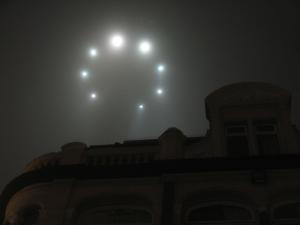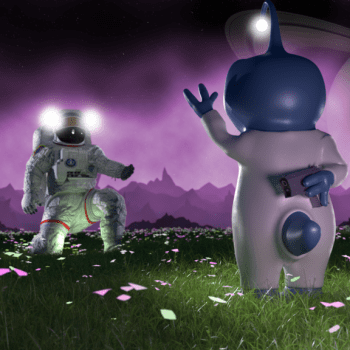
This week, Congress conducted a hearing investigating UFOs, trying to determine what exactly military officials know about them and the dangers they pose, not only to the United States, but to the world. Congress was given reports showing that, indeed, the military has had several encounters with flying objects which they cannot identify. While some think this means we are dealing with extra-terrestrial life, the reports which indicate that we do not have the evidence necessary to say without a reasonable doubt that UFOs represent a non-terrestrial phenomenon:
The military’s 2021 report said no evidence of aliens had been found. Scott W. Bray, the deputy director of Naval intelligence, told lawmakers that they still haven’t uncovered anything “nonterrestrial in origin,” even though there are incidents they can’t explain.[1]
The hearing has been called, in part, because Congress feels it has not been properly kept up to date as to what the military knows or does not know about UFOs. They think, due to the potential danger inherent with the phenomenon, Congress should be consistently kept up to date so that they can play their part in making decisions in regards that danger. Many within Congress thinks this means that more investigation should be done in regards the origin of the UFOs:
But some leading sponsors of recent legislation want more analysts and surveillance systems dedicated to determining the aircrafts’ origin — and not just more reports of their existence.[2]
Congress wants the military to be much more transparent as to what is happening and what they are doing. The fact that many of the incidents are brief itself raises questions, including the possibility that whatever lies behind the UFO incidents is intelligent and is actively seeking to hide itself from detection. Nonetheless, it is important to reiterate, what has been observed does not indicate the origin of the UFOs needs to be extra-terrestrial in origin, though, as many would also indicate, this does not mean such a source for their activity has been ruled out. We do not know what we are dealing with, and that is why more research needs to be done. While some speculate that the odds are extremely low that non-terrestrial life would ever visit us on the Earth, those working out such odds are basing their analysis on an extremely limited understanding of the universe, and so they could be using many false assumptions to form their equations. Of course, we should be cautious, and not speculate based upon the most extravagant claims, suggesting that UFOs clearly are non-terrestrial in origin, because that would be an extraordinary claim, and extraordinary claims require extraordinary evidence. Unless there is something being hidden from us, right now, all we have is speculation.
From a Christian perspective, we cannot rule out the possibility that we are dealing with extra-terrestrial life. While some Christians deny such life exists, they do so mostly with the assumption that Scripture would tell us if such life existed; that argument, however, is merely an argument from silence. There is much which we have learned about the universe which Scripture has not directly referenced, and that is not surprising, since Scripture was not written to give us a complete, all-encompassing understanding of what exists. Its purpose is to teach us about our place in the universe, our relationship with God, and the way God, out of love, works for us (and also for the rest of creation). Another reason why some deny other intelligent forms of life would exist in the universe is because of their understanding of the incarnation and what they think was achieved by it. They suggest God became human so that only for the sake of humanity. That ignores the way Scripture suggests God is at work in Christ to save and perfect all creation:
In him we have redemption through his blood, the forgiveness of our trespasses, according to the riches of his grace which he lavished upon us. For he has made known to us in all wisdom and insight the mystery of his will, according to his purpose which he set forth in Christ as a plan for the fulness of time, to unite all things in him, things in heaven and things on earth (Eph. 1:7 – 10 RSV).
Scripture tells us that the incarnation took place so that he Logos could reconcile all things with God:
For in him all the fulness of God was pleased to dwell, and through him to reconcile to himself all things, whether on earth or in heaven, making peace by the blood of his cross (Col. 1:19-20 RSV).
Christian tradition has long explored the cosmic significance of the incarnation. If there are forms of life in the universe which we do not know, God knows of them, and has a place for them in the midst of Christ’s cosmic accomplishments. Of course, this does not mean God cannot and will not engage them in other ways, ways which we do not yet know, for it is clear, God, and the acts of God, transcend our knowledge and understanding.
Thus, the two most common objections some Christians use to deny the possibility of extra-terrestrial life are not as credible as they might think. This is not to say that such life must exist. What it means is that Christians can accept the possibility that God created such life, and leave it up to God as to how God works in and with them. Historically, we find many Christians not only believed that such life was possible, but thought it made more sense than not that it existed. Nicholas of Cusa, for example, thought that the universe should be filled with life. While he was wrong in assuming where we would find such life, such as on the moon, his reflections show us how Christianity could and did make room for the existence of intelligent non-human life. Indeed, he thought the size of the universe, and what we know of how God works in and with creation, gives us sufficient reason to believe in such life, even if such life would likely be in a form far different from what we are used to:
Therefore, the inhabitants of other stars—of whatever sort these inhabitants might be—bear no comparative relationship to the inhabitants of the earth (istius mundi). [This is true] even if, with respect to the goal of the universe, that entire region bears to this entire region a certain comparative relationship which is hidden to us—so that in this way the inhabitants of this earth or region bear, through the medium of the whole region, a certain mutual relationship to those other inhabitants.[3]
Nicholas wanted to be clear that such speculation, though it engages what we know of God and so can be shown to be reasonable, must be done with all humility. We must accept that we only know what has been revealed to us (either from God or from our experiences in life). Christians must believe that, in some fashion or other, God created the universe, and God works to preserve and save all that has been created. What we do not know, unless it is revealed to us by God or we encounter it for ourselves, is what kinds of life, if any, exist elsewhere in the universe:
Of himself a man cannot know these matters; [he can know them] only if he has [this knowledge] from God in a quite special way. Although no one doubts that the Perfect God created all things for Himself and that He does not will the destruction of any of the things He created, and although everyone knows that God is a very generous rewarder of all who worship Him, nevertheless only God Himself, who is His own Activity, knows the manner of Divine Activity’s present and future remuneration. [4]
Nicholas is far from the first to discuss and present the possibility that other forms of life can exist in the universe; indeed, we find that such a notion can be traced back to pre-Christian times, and has been one consistently discussed and debated among Christians (with some Christians holding that such life exists, and other denying its existence). The debate concerning other worlds is a debate which is similar to the kinds of debate which Christians had as to what kinds of intelligent forms of life existed on the Earth itself; the fact that many Christians thought there were faeries, and that their existence would not contradict the Christian faith, indicates that Christianity can and should be willing to consider all kinds of cosmological possibilities. Christians should not feel they must be bound to one cosmological understanding. Indeed, Christians have consistently found themselves having to discard one model of the universe for another, when science indicated that various models were wrong (as happened when Ptolemy’s cosmology was replaced with Copernicus’ views, or when simple creationism was replaced with evolution).
Christians can and should accept the possibility of a universe filled with life. Indeed, if we believe God created the universe out of love, and with that love, out of a desire to create others who can and will share in the divine life with that love, we should not be surprised if this is proven to be the case. Certainly, we have learned, contrary to the assumptions of some, life is not so prevalent in the universe that we will find everywhere. Why this is the case, we do not know. But we must not use this to assume that this means such life is rare, or that we cannot encounter such life. Those who want us to consider the possibility that such life exists, and we can, or even have, encountered it in our history, should not be outright dismissed. We should be skeptical and yet open to the possibility, looking at the evidence we have and use it rationally to consider all the possibilities which lie before us. This is why Congress is right in investigating the UFO phenomenon, wanting the military to handle it better, to be more transparent with what they have encountered and learned. It is important for us to be ready to deal with such life, if we ever deal with it, and the best way we can be ready is to contemplate it and consider the implications long before we ever encounter it in any significant way. That way, we can be ready, not only for the possible dangers they might indicate for us, but also for the way encountering such life would change our understanding of the universe.
[1] Christopher Dean Hopkins, “The Military’s UFO Database Now Has Info From About 400 Reported Incidents” in NPR (5-17-2022)
[2] Bryan Bender, “The UFO Briefings On Capitol Hill Have Begun. Lawmakers Aren’t Impressed” in Politico (5-2-2022).
[3] Nicholas of Cusa, On Learned Ignorance. Trans. Jasper Hopkins (Minneapolis: Arthur J. Banning Press, 1985; second ed, 1990), 119-20.
[4] Nicholas of Cusa, On Learned Ignorance, 121.
Stay in touch! Like A Little Bit of Nothing on Facebook.
If you liked what you read, please consider sharing it with your friends and family!













